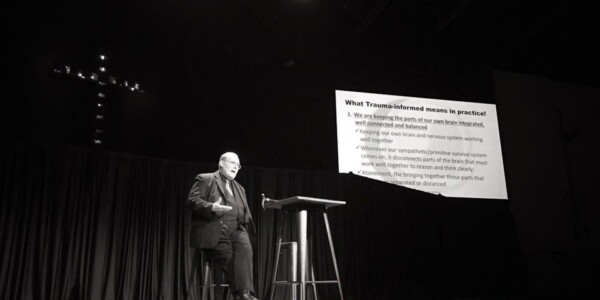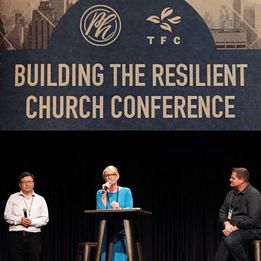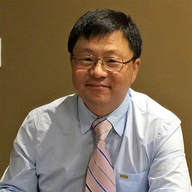This article was originally posted on the ICTG Blog March 12, 2018
The Resilient Church Conference
From Mistrust to Hope: A Post-conference Reflection of The Resilient Church
On February 9th, 2018, Pure Heart Church and The Faithful City (TFC) hosted “The Resilient Church Conference” (short video here) in Glendale, Arizona. There were 25 speakers who conducted keynote speeches and breakout sessions that focused on trauma, addiction, and mental health. This was a historic and successful event that made me sincerely grateful to God and those involved, including Pastor Dan Steffen and Brenda Cochran of Pure Heart Church, TFC leaders, conference speakers, and volunteers.
Over 250 attendees enjoyed the conference and affirmed their appreciation and passion for future involvement in the trauma-informed community movement. After reflecting on the journey of organizing the conference, from the initial meeting one year ago to the evaluation meeting that just happened last week, there was one phrase came to my mind: “From Mistrust to Hope.”
This phrase embodies my personal relationship with the trauma field. After earning my undergraduate degrees, I pursued further education to become a social work professional in the area of trauma. However, I discovered that my true calling was for ministry, so I started to study at seminary. I became an ordained pastor, dedicating my life to raising followers of Jesus. This decision was not easy for me for many reasons. One of these reasons was based on my experiences of witnessing strong mistrust within and between the mental health and faith communities. I sensed there was a vast chasm between the two fields ideologically and practically. I desperately wanted to integrate both into my career, but this felt impossible and hopeless.
Then, in 2015, I found myself in Washington, DC, talking with Kimberly Konkel who was leading the trauma-informed congregation movement as the Director for Health in the HHS Center for Faith-based and Neighborhood Partnerships. It had been twenty years since I had talked with someone about trauma and mental health, which felt ironic given that I possessed a social work degree and background. This encounter was a pivotal moment in my career as it inspired me to merge mental health and faith in my work. I was so delighted to discover that current neuroscience development supports what the Scriptures and my faith teach. I could now envision my former career and ministry finally coming together.
This new vision generated tremendous hope and passion in me. I committed to the trauma-informed community movement. All of the credit for the development of relationships and communities belongs to God’s favor and providence. I found that divine connections and appointments were happening every day. For instance, I became connected to Marcia Stanton from the Phoenix Children’s Hospital. Marcia Stanton has been a pioneer in the trauma field and has been leading the Arizona ACE Consortium for 10 years. I also met Brenda from Pure Heart, who became my major partner for developing the conference. Moreover, I had the exciting opportunity to meet and get to know Dr. Robert Rhoton, who is the CEO of Arizona Trauma Institute as well as an outstanding therapist and trainer. I love and admire his passion and zeal for seeking out genuine love and self-regulation of the healer.
At the end of 2016, I founded AZTIFC (Arizona Trauma Informed Faith Community) to begin mobilizing and collaborating with other local community organizations. This initiative opened the floodgates of faith leaders, clinicians, survivors, advocates, government offices, and other working professionals that are all passionate and committed to fighting the effects of trauma. I never expected such hunger and excitement from the community, and I am still overwhelmed and grateful for AZTIFC members and their expertise.
Our goal is to be a trauma-informed community or a safe environment with authentic care and passion for one another as well as for the broader community. We aim to build a resilient community of pioneers and professionals, a community where our mistrust becomes reconciled, wounds get healed, and skepticism turns into hope.
All of these stories and developments from the last three years became the core foundation of “The Resilient Church Conference”. This conference was the first statewide fruition of the trauma-informed faith community movement and would not have been possible without the local community leaders. From my reflection, the key components of the conference were: relationship building; unity of humble and passionate leaders; honesty and transparency; genuine love and care; unceasing commitment; and presentations professional knowledge with practical skills.
Our twenty-five speakers radiated these traits through their outstanding speeches and presentations. In addition to the diversity of speakers and breakout session tracks, many attendees remarked how amazed they were by the speakers’ united front regarding their mission and zeal for the community. The conference buzzed with a high level of engagement among participants, speakers, and exhibitor tables. This produced a new hope for future collaboration in building a resilient church and community altogether.
The first annual conference was an enormous success, and we are already looking forward to next year’s conference on February 8, 2019.
I truly believe that the conference greatly impacted all of the participants. SAMHSA provides guiding principles for trauma-informed care. Some of these examples are safety; trustworthiness and transparency; collaboration and mutuality; empowerment, voice, and choice. The conference fulfilled these principles, as it was a space for all to learn from one another and share their life experiences. I hope the conference provided at least some attendees an opportunity to heal past wounds and receive encouragement for further recovery. I pray it also turns the atmosphere of mistrust between the mental health and faith communities into one of hope for reconciliation, integration, and collaboration as it happened to me three years ago in Washington, DC.




 Rev. Sanghoon Yoo MSW, MDiv., the founder of The Faithful City, has led ministries and social services at Arizona State University and the Phoenix metropolitan area over two decades. He also serves the national committee of Ethnic America Network (EAN). Recently he launched “Arizona Trauma Informed Faith Community” (AZTIFC), collaborating with Arizona ACE Consortium and many other organizations to mobilize a statewide movement for building resilient communities with trauma informed care.
Rev. Sanghoon Yoo MSW, MDiv., the founder of The Faithful City, has led ministries and social services at Arizona State University and the Phoenix metropolitan area over two decades. He also serves the national committee of Ethnic America Network (EAN). Recently he launched “Arizona Trauma Informed Faith Community” (AZTIFC), collaborating with Arizona ACE Consortium and many other organizations to mobilize a statewide movement for building resilient communities with trauma informed care.
